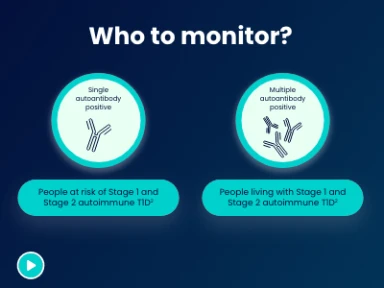- Resource
- BR1DGE
- Animation
- Disease Burden
- Management
- Monitoring
Providing Psychosocial Care for Individuals with Presymptomatic Autoimmune T1D
Learn about the psychosocial impacts of type 1 diabetes and explore expert guidance on how to integrate psychosocial care into routine care.
Learning Objectives
- Recognize the psychosocial impacts of type 1 diabetes (T1D) on individuals and their families
- Explore expert clinical guidance on how to integrate mental health support into routine care for people with presymptomatic T1D

Summary
Living with autoimmune type 1 diabetes (T1D) is challenging and can impose a lifelong and multi-dimensional burden on both individuals and their families.
When first diagnosed with autoimmune T1D, individuals often undergo a brief hospital stay or emergency visit. This initial phase can be especially traumatic and overwhelming as individuals and their families adapt to new norms at home and school and have to learn how to cope with a chronic illness.
People who learn that they or a family member have islet autoantibodies may also experience stress and can experience a range of emotional and behavioral reactions.
International consensus guidance recommends enquiring about how individuals are dealing with the news and their current needs during every monitoring visit. If available, HCPs should refer individuals to mental and behavioral health professionals with expertise in autoimmune T1D for additional assessment.
It is important to consider developmental and family-specific factors when assessing psychosocial needs. Children and adolescents may experience varied emotional, cognitive and behavioral impacts.
Psychosocial care should be integrated into routine medical visits by clinicians focusing on collaborative, person-centric and culturally informed approaches.
MAT-XU-2500230 (v1.0) Date of preparation: 02/2025



